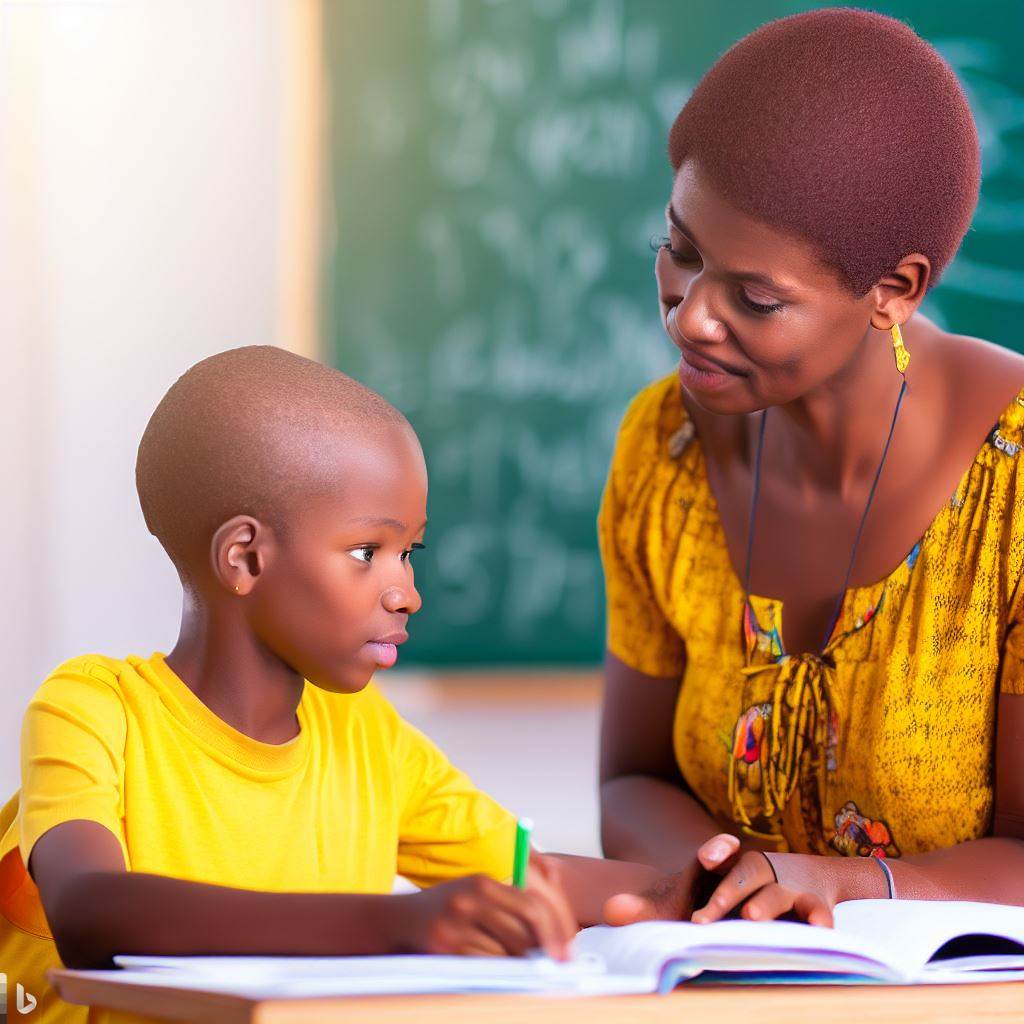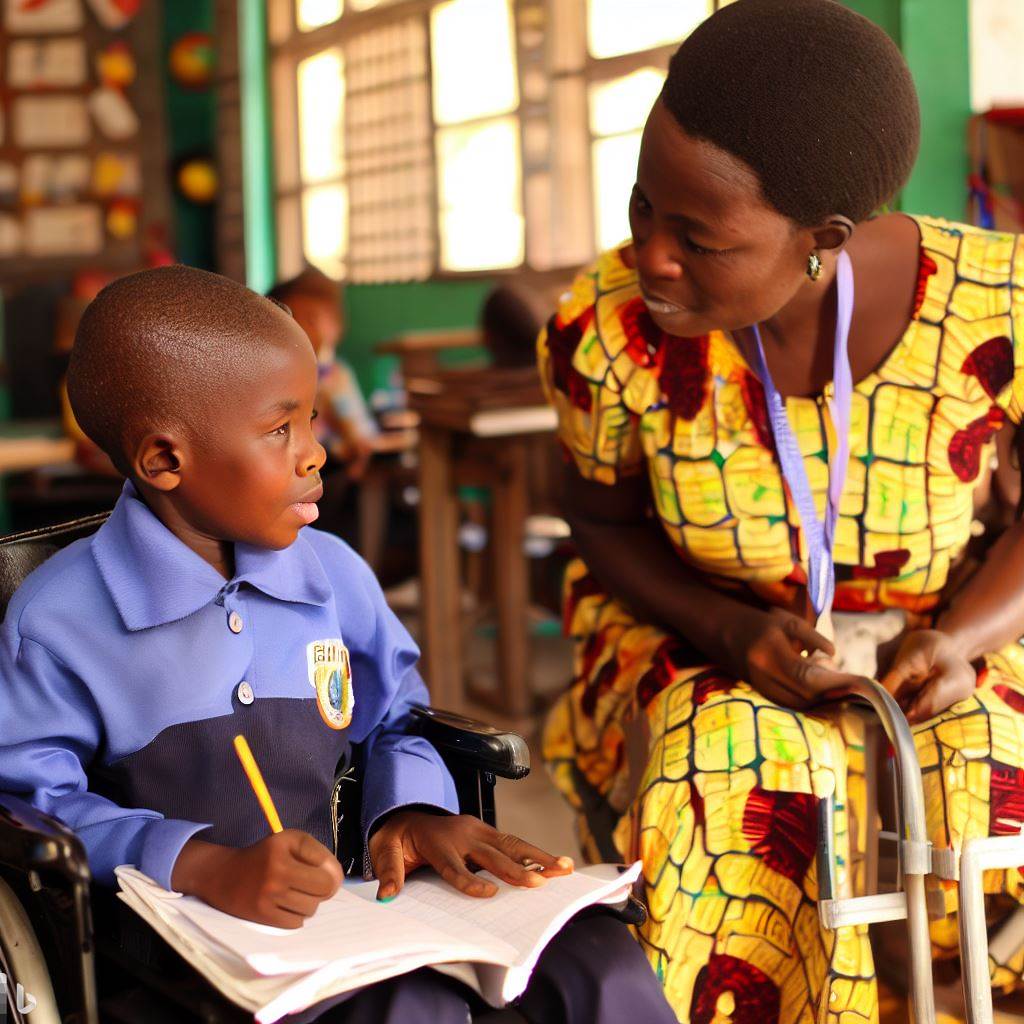Introduction
Special education in Nigeria has a unique development and implementation process. Understanding parental perceptions is crucial for effective special education practices in Nigeria.
This blog post aims to explore the parental perceptions of special education in Nigeria.
Special education in Nigeria has evolved significantly over the years, with a distinct approach to development and implementation.
It is essential to comprehend the perspectives of parents in this context. Parental perceptions play a crucial role in shaping the effectiveness of special education practices in Nigeria.
The objective of this blog post is to shed light on the various aspects of parental perceptions of special education.
By examining how parents perceive special education in Nigeria, we can understand their concerns, expectations, and experiences related to their children’s education.
Understanding parental perceptions can provide valuable insights into the challenges faced by both parents and educators in the field of special education.
By delving into these perceptions, we can identify areas for improvement and propose strategies to enhance the overall quality of special education in Nigeria.
In the following sections, we will explore the factors influencing parental perceptions, the impact of these perceptions on children’s education, and possible ways to bridge the gaps between parents and educators.
By doing so, we hope to contribute to the ongoing conversation surrounding special education and facilitate positive changes in this field in Nigeria.
Stay tuned for the upcoming sections, where we will delve deeper into the topic by analyzing the challenges faced by parents and the potential solutions to address their concerns effectively.
The Current State of Special Education in Nigeria
Overview of Special Education Policies and Programs
In Nigeria, special education refers to the education of individuals with disabilities or special needs, which are physical, intellectual, emotional, or sensory in nature.
The Nigerian government has implemented policies and programs to ensure inclusivity and provide educational opportunities for this marginalized group.
The Special Education Policy of Nigeria, introduced in 2006, emphasizes the right to education for all children, including those with disabilities.
It focuses on promoting equal opportunities and integration into the regular education system.
Additionally, the Education for All (EFA) policy, adopted in 2010, further aims to improve access to quality education for all children, including those with disabilities.
Various programs have been established to support the implementation of these policies.
The Special Education Unit within the Federal Ministry of Education oversees and coordinates special education activities across the country.
Furthermore, there are specialized schools and centers that cater specifically to children with disabilities.
Challenges Faced by the Nigerian Special Education System
- Lack of Funding and Resources: One of the major challenges faced by the Nigerian special education system is the insufficient allocation of funds and resources.
Limited financial support hampers the quality and availability of special education services. - Inadequate Training for Teachers: Another significant challenge is the lack of proper training for teachers in special education.
Many regular school teachers lack the necessary knowledge and skills to effectively teach students with disabilities, resulting in limited learning opportunities. - Limited Accessibility to Services and Facilities: Accessibility to special education services and facilities remains a major barrier.
Special schools and centers are often located in urban areas, making it difficult for children living in rural areas to access them.
Furthermore, there is a scarcity of supportive infrastructure in mainstream schools.
The combination of these challenges contributes to the substandard state of special education in Nigeria.
Children with disabilities are often marginalized, denied equal opportunities, and face barriers to full participation in the education system.
To address these issues, it is crucial for the Nigerian government to prioritize special education and allocate sufficient funds for its development and improvement.
Increased investment in training programs for teachers, both in pre-service and in-service contexts, will enhance their capacity to cater to diverse learners.
Additionally, efforts must be made to enhance accessibility to special education services by establishing more schools and centers in rural areas and ensuring the provision of necessary infrastructure in mainstream schools.
By improving the state of special education in Nigeria, parents and caregivers can have greater confidence in the system and their children’s educational prospects.
Every child deserves an equal opportunity to succeed and thrive, regardless of their abilities or disabilities.
Read: The Demand and Supply Gap of Special Ed Teachers in Nigeria
Parental perceptions towards special education in Nigeria
Cultural beliefs and stigma associated with disabilities
- Nigerian cultural beliefs often stigmatize individuals with disabilities.
- Parents may view disabilities as a curse and feel ashamed of having a child with special needs.
- Stigma can lead parents to hide their children with disabilities from the public eye.
- Cultural beliefs may discourage parents from seeking special education services for their children.
- Lack of acceptance in society can negatively impact parents’ perceptions of special education.
Lack of awareness and knowledge about special education
- Many parents in Nigeria have limited awareness of special education and its benefits.
- Lack of knowledge about available resources and support systems can discourage parents from seeking specialized education for their children.
- Limited access to information about inclusive education is a significant barrier for parents.
- Without proper knowledge, parents may not understand the rights and opportunities available to their children.
- Educational institutions and government bodies must improve awareness campaigns to reach parents effectively.
Parental involvement and engagement with the education system
- Parents play a crucial role in the education of children with special needs.
- Lack of parental involvement can hinder the progress and development of a child with disabilities.
- Communication between parents and educators is essential for successful special education.
- Some parents may feel intimidated or marginalized by the education system.
- Collaborative efforts between parents and teachers can result in better outcomes for children with special needs.
In the end, parental perceptions towards special education in Nigeria are influenced by cultural beliefs and stigma, lack of awareness and knowledge about special education, and parental involvement and engagement with the education system.
Addressing these barriers is crucial for improving the quality of special education and ensuring equal opportunities for children with disabilities in Nigeria.
Read: Improving Special Education with Nigerian Government Policies
Impact of parental perceptions on the education of children with special needs
Potential barriers to accessing appropriate education and services
- Insufficient special education facilities and resources in Nigeria
- Limited availability of trained teachers and specialists
- Lack of inclusive education policies and frameworks
- Financial constraints and high costs associated with special education
- Inadequate support for children with special needs in mainstream schools
Parents’ perceptions of special education in Nigeria have a significant impact on their children’s education and well-being.
The absence of appropriate services and lack of access to inclusive education create significant barriers for children with special needs.
The limited availability of trained teachers and resources further hinders their educational progress.
The financial burden associated with special education also restricts many families from providing the necessary support to their children.
Read: A Comprehensive Overview of Special Education in Nigeria
Influence on children’s self-esteem and social acceptance
- Parental perceptions impact how children view themselves and their abilities
- Negative parental attitudes can undermine a child’s self-confidence and belief in their potential
- Positive parental support fosters a sense of acceptance and belonging
- Children may struggle to form social connections if their parents have discriminatory views
- Parental acceptance and encouragement greatly enhance children’s overall well-being and happiness
Moreover, parental perceptions contribute to children’s self-esteem and social acceptance. Negative attitudes and beliefs can undermine a child’s confidence and limit their opportunities for social integration.
On the other hand, positive parental support fosters a sense of belonging and encourages children to embrace their differences, ultimately enhancing their overall well-being.
Importance of parental advocacy and support
- Parents play a crucial role in advocating for their children’s educational rights
- Active involvement and participation in IEP meetings and decision-making processes
- Effective communication with teachers, school administrators, and policymakers
- Collaboration with other parents and support groups to amplify their voices
- Serving as role models for their children by being their voice and advocates
Parental advocacy and support are crucial in addressing these challenges. Parents need to actively advocate for their children’s rights to access appropriate education and services.
This includes participating in Individualized Education Program (IEP) meetings, effectively communicating with educational stakeholders, and collaborating with other parents and support groups.
By serving as role models, parents can empower their children and ensure their voices are heard.
In short, parental perceptions significantly influence the education and well-being of children with special needs in Nigeria.
Addressing potential barriers to accessing appropriate education, promoting positive attitudes, and ensuring parental advocacy and support are essential for creating an inclusive educational environment that allows every child to thrive.
Read: Case Studies: Successful Special Education Teachers in Nigeria

Efforts and initiatives to improve parental perceptions and involvement
Government initiatives and policies
The Nigerian government has recognized the importance of parental perceptions and involvement in special education.
Government initiatives include the development of policies that aim to increase parental awareness and understanding.
These policies emphasize the need for collaboration between parents, schools, and other stakeholders in special education.
They also focus on providing resources and support services to empower parents and ensure their active participation.
One such initiative is the establishment of parent training programs, workshops, and support groups.
These programs aim to educate parents about the rights and needs of their children with special needs.
By equipping parents with knowledge and skills, the government hopes to improve their perceptions and engagement.
Additionally, government strategies involve the appointment of special education coordinators to work closely with parents.
These coordinators act as liaisons between parents and schools, addressing concerns and facilitating effective communication.
Non-governmental organizations promoting awareness and support
Non-governmental organizations (NGOs) in Nigeria also play a significant role in improving parental perceptions and involvement.
These organizations work tirelessly to promote awareness and support for special education among parents.
NGOs focus on conducting sensitization campaigns to debunk myths and misconceptions surrounding special education.
They organize workshops, seminars, and conferences to engage parents and provide them with valuable information.
Furthermore, NGOs collaborate with schools and government bodies to advocate for the rights of children with special needs.
NGOs also offer counseling and support services, ensuring that parents have access to the assistance they need.
Through their efforts, these organizations create a supportive network that encourages parents to actively participate in their child’s education.
Role of schools and educators in engaging parents
Schools and educators have a crucial role to play in improving parental perceptions and involvement in special education.
Teachers and administrators should strive to create a welcoming and inclusive environment for parents.
Open communication channels should be established, allowing parents to express their concerns and ask questions freely.
Regular meetings and parent-teacher conferences should be held to update parents on their child’s progress and development.
Teachers can also provide workshops and training sessions specifically designed for parents.
This empowers parents to actively support their child’s learning at home and collaborate effectively with teachers.
By involving parents in decision-making processes, schools can ensure a collaborative approach that benefits the child.
Teachers and educators can also act as advocates for parent involvement, emphasizing its importance to parents and the wider community.
When parents feel listened to and valued, their perceptions and level of engagement in special education are likely to improve.
In essence, improving parental perceptions and involvement in special education in Nigeria requires collaborative efforts from various stakeholders.
The government, non-governmental organizations, schools, and educators all have important roles to play.
By implementing government initiatives, promoting awareness, and creating supportive environments, parental perceptions can be positively transformed.
Ultimately, when parents are actively involved in their child’s special education journey, the overall outcomes improve significantly.
Read: Building Inclusive Classrooms: The Nigerian Perspective
Recommendations for enhancing parental perceptions of special education
Providing accessible information and parent training programs
- Develop user-friendly materials to provide parents with clear and concise information about special education.
- Offer parent training programs that educate parents about the rights and benefits of special education.
- Incorporate workshops and seminars to equip parents with the necessary skills to navigate the special education system.
- Ensure that information and training programs are available in local languages and accessible to parents with disabilities.
- Create online platforms or mobile applications to disseminate information and provide support to parents.
Sensitizing communities and reducing stigma through awareness campaigns
- Launch awareness campaigns to educate the general public about the importance and benefits of special education.
- Use various media channels, such as TV, radio, newspapers, and social media, to reach a wider audience.
- Organize community events and workshops to raise awareness and challenge negative perceptions surrounding special education.
- Partner with influential individuals and organizations to help spread the message and promote acceptance.
- Involve parents of children with special needs as ambassadors to share their personal experiences and advocate for inclusion.
Collaborating with parents in decision-making processes
- Establish parent advisory committees to actively involve parents in decision-making processes regarding special education policies and practices.
- Encourage regular parent-teacher meetings to create a collaborative environment and ensure parents’ voices are heard.
- Provide opportunities for parents to participate in school and classroom activities, fostering a sense of ownership and partnership.
- Support parent-led initiatives and organizations that promote parental involvement and advocacy in special education.
- Train educators and administrators on the importance of parent collaboration and effective communication strategies.
By implementing these recommendations, Nigeria can foster positive parental perceptions of special education, leading to improved support and outcomes for children with special needs.
Read: Insights into the Teaching Profession in Nigeria Today
Discover More: The Impact of Teachers on Nigeria’s Development
Conclusion
Throughout this blog post, we have explored the parental perceptions of special education in Nigeria.
We discussed how these perceptions shape the education outcomes for children with special needs, highlighting the need for change.
It is crucial to address and alter these perceptions as they directly impact the quality of education and support provided to children with special needs.
By changing parental perspectives, we can improve the overall outcomes for these students.
In order to bring about meaningful change, there must be increased support and involvement in special education initiatives in Nigeria.
Parents, educators, policymakers, and the community at large need to come together to ensure that all children receive the education they deserve.
By actively supporting and advocating for special education, we can create a more inclusive and equitable society for children with special needs in Nigeria.
Let us work together to provide them with the necessary resources, opportunities, and support to thrive and succeed.




